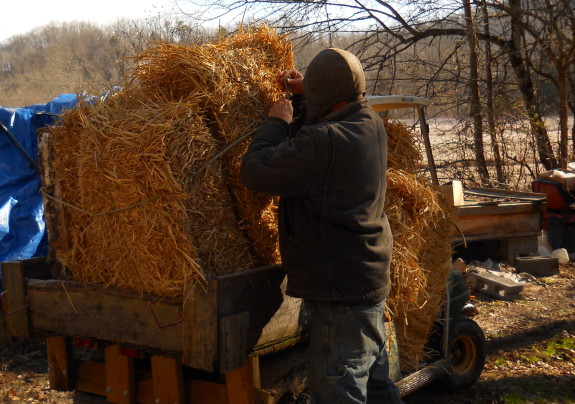
Loading up straw bales

We figured out today that
stacking straw in a vertical fashion on the golf cart allows us
to haul six bales compared to horizontal stacking that only gave us
four.
Want more in-depth information? Browse through our books.
Or explore more posts by date or by subject.
About us: Anna Hess and Mark Hamilton spent over a decade living self-sufficiently in the mountains of Virginia before moving north to start over from scratch in the foothills of Ohio. They've experimented with permaculture, no-till gardening, trailersteading, home-based microbusinesses and much more, writing about their adventures in both blogs and books.
Want to be notified when new comments are posted on this page? Click on the RSS button after you add a comment to subscribe to the comment feed, or simply check the box beside "email replies to me" while writing your comment.

Where do you find straw for sale? I look on craigslist and hardly ever see it. When I find it, it seems expensive. Can you get it at feed stores?
I've yet to use straw so I'm wondering if there is anything else I should know about it. Are there different varieties? Do you have to ask about whether or not it was sprayed with pesticide while growing or fungicides for storage or anything like that? Anything else a newbie should know? Thanks!
You can buy straw at feed stores, but it's quite expensive. We finally found a local farmer last year and just asked him when to contact him to get straw --- the answer was, I believe, June and November. That will depend on your climate, though, and on what kind of grains farmers grow there. It's best to get a big load at once, since the grains tend to ripen only twice a year.
There are different kinds of straw --- depending on what kind of grain it comes from. My understanding is that, for mulch, it doesn't make that big of a difference. (If you were building a straw bale house, that would be different.) In a perfect world, you'd ask if it was organically grown, but we didn't have many choices, so went with what was available. I suspect that the healthy soil food web under straw mulch breaks down most problematic chemicals in short order. (I wouldn't use non-organic straw to grow mushrooms, though.)